Intro to APE/ILE, 10/7
Category : News/Events
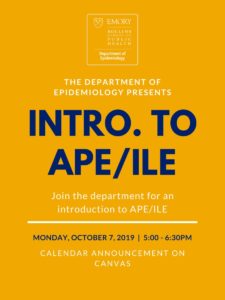
Join the Epidemiology Department for the Introduction to APE/ILE on October 7 from 5-6:30pm.
News, updates, and information for current students and alumni of the Department of Epidemiology at Rollins School of Public Health
Category : News/Events

Join the Epidemiology Department for the Introduction to APE/ILE on October 7 from 5-6:30pm.
Category : Alumni
JOB SUMMARY:
Supervises, guides, and/or instructs the work assignments of subordinate staff. Supervises epidemiologic investigations, surveillance, and interventions with significant impact on public health and the agency`s resources. Supervises the collection, analysis, and interpretation of complex statistical data and the preparation of epidemiologic reports.
DUTIES & RESPONSIBILITIES:
• Supervises and plans work of assigned staff.
• Collects, analyzes, and interprets statistical data and prepares reports.
• Provides training, technical assistance, and consultative services regarding epidemiology and the control of diseases.
• Serves as a point of contact for various personnel regarding moderately complex epidemiologic issues.
• Develops policies and procedures for new and existing disease control programs. Designs and leads, from conception to completion, long-term epidemiologic projects with significant impact on public health and the agency’s resources.
• Functions as principal investigator for investigations of diseases and oversees formal case control and cohort studies of complex health issues.
• Oversees the design, implementation, and maintenance of disease surveillance systems. Provides related training, mentoring, and consultation to departmental staff and others. Oversees epidemiologic programs for the control of communicable and/or chronic diseases.
• Develops presentations and publications.
MINIMUM QUALIFICATIONS:
Doctorate degree in public health, Epidemiology, biostatistics or a closely related field from an accredited college or university AND Two years of experience performing epidemiologic work or work in a closely related field OR Master`s degree in public health or a closely related field from an accredited college or university AND Five years of experience performing epidemiologic work or work in a closely related field OR Bachelor`s degree from an accredited college or university AND Six years of experience performing epidemiologic work or work in a closely related field OR One year of experience at the lower level Epidemiologist 3 (HCP182) or position equivalent.
PREFERRED QUALIFICATIONS:
Preference will be given to applicants who, in addition to meeting the minimum qualifications, possess two or more of the following:
1. Doctorate degree in Public Health, Epidemiology, Biostatistics.
2. Author of research article in a peer reviewed journal addressing problem in public health, epidemiology or biostatistics.
To apply, click HERE.
Category : Alumni
Mission: To prepare epidemiologists for public health leadership positions in California.
Goals:
To provide experience in epidemiology and public health practice during placements with governmental health agencies.
To produce well-trained epidemiologists for employment in California public health agencies.
To assist local health departments in emergency outbreak and other field of epidemiology investigations, if the opportunity arises.
California Epidemiologic Investigation Service (Cal-EIS) is a one- or two-year program for promising but green epidemiologists to gain hands-on experience working with an epidemiologist preceptor in either local or state health departments in California.
Established in 1989 in response to the California Conference of Local Health Officers’ need to employ qualified epidemiologists in California’s health departments, Cal-EIS provides one year of training in applied epidemiology for epidemiologists who have recently graduated from a Master’s degree program. Occasionally, there is the opportunity to extend the Fellowship for a second year.
Cal-EIS takes pride in public health workforce training. It is a unique program; very few states have a training program designed to train Master’s-level epidemiologists.
For more Information and to apply, click HERE.
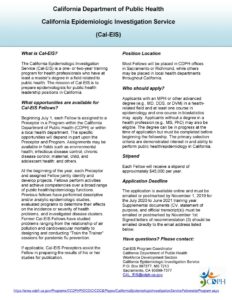
Category : PROspective
Have you ever joked about needing more hours in the day? Although I’d love to find a way to sneak in an extra hour or two, the hard truth is that we only have 24 hours to allocate across all of the demands on our time – both personal and professional. The article below has some good tips to consider for professional time management, although I’d add that it’s also important to think about how you allocate time to both your professional and personal selves. After all, none of us only exist in our work spaces!
After you read these tips, and review my thoughts below – I’d like you to consider taking on a 30 day planning challenge: adopt one or more of these strategies and stick to them (!!) for the next 30 days. At the end of that time, evaluate the effect that it had on your productivity and determine how you will approach the next 30 days. Let us know in the comments – which tips are you planning to adopt and how do you plan to institute them?
Each Sunday, I try to sit down and plan out the “must dos” to accomplish at work the following week. I plan around the meetings that are on my calendar, and block off time to complete these tasks. This is different than simply creating a to-do list. When I don’t dedicate time for specific tasks, I notice that my weeks aren’t as productive, and I have tasks that remain unfinished.
As part of my Sunday planning, I also keep track of the ~10,374 activities that our family might have in a given week. With 3 growing boys, you can safely assume that grocery shopping tops the list of family priorities! To avoid the weekend rush, we plan around my teaching schedule (I’m looking at you, EPI 740!), and shop on a weeknight when I can get home a little early. This semester, Mondays are for grocery shopping – this means that I know not to count on having extra time on Monday evenings to catch up on work. I am protective of my time both at work and at home – I try not to let one bleed into the other, but certainly there are times when I have to make exceptions.
Last – but certainly not least – I plan time to take care of myself. After much trial and error, I realized that there is much truth in the expression “you can’t pour from an empty cup.” Whether it is exercise, reading, cooking, being in nature, or spending time with friends – find things that are truly rejuvenating for you and engage in those routinely. Personally, I love to sew – you can see a sampling of some recent projects here!
We are in the business of prevention, and yet we often work ourselves into the ground without realizing that we could have intervened and had a different outcome (hello, counterfactual!). The time that you spend caring for yourself is a worthwhile investment, and will likely amount to less time than you would need to recover after overworking yourself.
8 crucial time management tips adapted from “Jump Start Productivity,” Healthcare Executive, September/October 2010
Category : #WeAreEmoryEPI
For this week’s #IamEmoryEPI, we caught up with Dr. Lauren McCullough!
Tell us where you went to school:
I received my BA from Vanderbilt, my MSPH from Meharry Medical College, and my PhD from UNC Chapel Hill.
What are your primary research interests?
I am interested in molecular epidemiology of obesity as it relates to cancer progression and outcomes and multi-level drivers of disparities in breast cancer outcomes.
What did you do this past summer?
At work: I organized my research projects, as well as on-boarded new staff and trainees.
At home: Baseball….everyday…..all day…..baseball.
How did you find the research that you are currently conducting?
I have a personal connection to cancer, and my undergraduate training in influenced my decision to study molecular epidemiology. Being raised in a primarily African-American community and seeing first-hand disparities in all aspects of life (i.e. health, housing, income) strongly influences the questions I ask and populations I serve.
What is your favorite part about being at Emory?
Hands down my trainees. We work hard, we learn from each other, we laugh together. They really are an extension of my family. Couldn’t ask for more!
Do you have any advice for MPH students?
Network. The market is competitive; the more you can get to know people (professors, professionals, peers) the better your odds of landing a job or successfully competing for graduate/professional school
What are three fun facts about yourself?
Category : News/Events
Training Description
Systems thinking, especially with simulation models, facilitates understanding of complex health policy problems. Using a simulation model to educate legislators, public health experts, and education leaders about the policies that have the greatest short- and long-term impact on childhood obesity can encourage strategic investment in low-cost, high-return policies. This webinar will feature the Georgia childhood obesity model created by and for legislators and other stakeholders to support dialogue on policy interventions designed to reduce childhood obesity (specifically, BMI for age percentiles). Participants will have the opportunity to explore the model and understand how policies and evidence-based interventions can impact obesity prevalence and costs over time.
Learning Objectives
By the end of this training, participants will be able to:
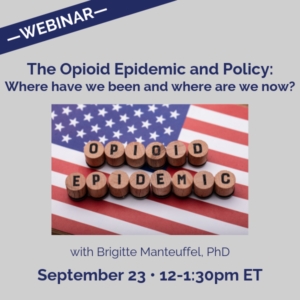
To register, click HERE.
Category : News/Events
This is an in-person workshop in Sebring, FL.
“Culture eats strategy for breakfast.” Vibrant workplace culture helps retain staff and improve productivity, while toxic culture does the opposite.
Leaders shape both the direction of their organizations and also shape the culture. Successful leaders are self-aware and recognize their roles in shaping culture. They can identify strengths in themselves and others,
articulate their values, and know how to leverage both to build a productive culture. This workshop uses Gallup’s CliftonStrengths assessment to help emerging and established public health leaders navigate the path of building positive workplace culture through understanding their strengths and values.
Prior to the workshop, all participants will take the CliftonStrengths assessment and receive descriptions of their top five strengths. These results will be discussed in depth during the workshop through the lens of leadership and creating workplace culture. This workshop also includes a deep dive on personal workplace values and use of the Team Strengths Grid, which helps to visualize the collective strengths for teams of all sizes. The workshop will be highly interactive and participatory and will provide avenues to help participants bring CliftonStrengths back to their own teams.
Please note: Participants are required to complete a 35-45 minute online StrengthsFinder test before attending this workshop. Detailed instructions will be provided via email two weeks prior to the class.
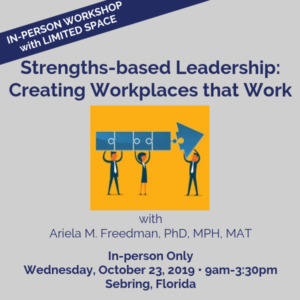
To register, click HERE.
Category : News/Events
Training Description
Fran T. Close, Ph.D., is full Professor of Behavioral Science and Health Education in the College of Pharmacy and Pharmaceutical Sciences/Institute of Public Health at Florida A&M University (FAMU). An accomplished public health researcher with a focus on community based participatory research in underserved communities. Dr. Close has been the principal investigator or co-principal investigator on grants totaling over $4 million during her tenure at FAMU. Her research interests are in the area of racial disparity issues in Women’s Health and Maternal, Child and Infant Health. Currently, she serves on the United Way of the Big Bend’s Board of Directors. In addition, Dr. Close is the past Chair of the United Way’s Health Council, where they explored mental health in the Tallahassee community as well as dental programs for school age children in Leon and Gadsden Counties. Dr. Close is a member of the Mental Health Council of the Big Bend, where she serves as the Chair of the ENGAGE community focusing on stigma of mental health in the African American community.
Dr. Close holds a doctorate degree in Pharmacology/Toxicology from Florida A&M University and a Bachelor’s of Science degree in Biological Science from Florida State University.
Learning Objectives
By the end of this training, participants will be able to:
Apply cultural competence and cultural humility to public health practice
Understand how mental health and the stigma impacts communities
Understand how mental health conditions adversely impact maternal health
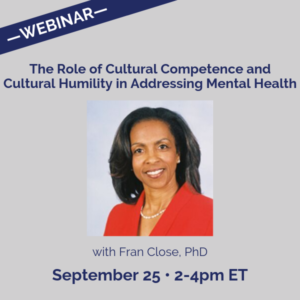
To register, click HERE.
Category : GLEPI Student Opportunities
Bring your lunch and learn about a funding opportunity to support field work in low- and middle- income countries!
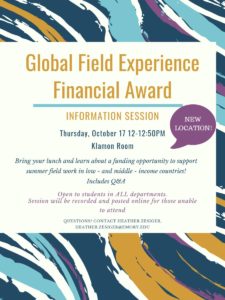
Category : Alumni
A research opportunity is currently available with the Epidemiology and Surveillance Branch (ESB), Division of Heart Disease and Stroke Prevention (DHDSP), within the National Center for Chronic Disease Prevention and Health Promotion (NCCDPHP) at the Centers for Disease Control and Prevention (CDC) in Atlanta, Georgia.
The Epidemiology and Surveillance Branch monitors heart disease and stroke patterns and trends through the timely collection, analysis, interpretation, and dissemination of programmatically relevant data.
Under the guidance of a mentor, the selected participant will have the opportunity to gain experience in advanced spatial and spatiotemporal studies of heart disease and stroke morbidity and mortality. These activities may include:
Creating, updating, analyzing and managing very large datasets
Participating in advanced spatial and/or spatio-temporal analyses of heart disease and stroke morbidity, mortality and risk factors using Bayesian and frequentist approaches
Writing summaries of methods, results and interpretations for use in government reports and peer-reviewed articles
Conducting literature reviews
Presenting the results to internal and external audiences, including professional meetings and/or conferences
Anticipated Appointment Start Date: October 28, 2019
This program, administered by ORAU through its contract with the U.S. Department of Energy to manage the Oak Ridge Institute for Science and Education, was established through an interagency agreement between DOE and CDC. The initial appointment can be up to one year, but may be renewed upon recommendation of CDC contingent on the availability of funds. The participant will receive a monthly stipend commensurate with educational level and experience. Proof of health insurance is required for participation in this program. The appointment is full-time at CDC in the Atlanta, Georgia, area. Participants do not become employees of CDC, DOE or the program administrator, and there are no employment-related benefits.
Qualifications
The qualified candidate should have received a master’s or doctoral degree in one of the relevant fields, or be currently pursuing one of the degrees and will reach completion by the start date of the appointment. Degree must have been received within five years of the appointment start date.
Preferred skills:
Experience analyzing spatial and/or spatiotemporal data
Experience in the management and analysis of large data sets
Knowledge/Awareness of Bayesian statistical methods
Experience using statistical software, such as SAS or R, for data analysis
Experience using ArcGIS or other mapping software package
For more information and to apply, click HERE.
Recent Comments